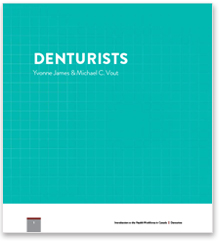A Denturist is defined as a ‘dental’ health care professional who provides denture care directly to the public. A Denturist is an independent self-regulated professional who works with other oral health care providers, including Dentists, Dental Hygienists, Dental Technicians, and Oral Surgeons, as part of the Dental Health Team to provide the best denture care and service to their patients.
With the focus on oral hygiene in dentistry after 1910, the emphasis changed from mechanical perfection to biology. The fabrication of appliances became incidental. Dental technicians had acquired many of the skills and technical duties formerly performed exclusively by dentists, particularly dentures. The establishment of the Royal Canadian Dental Corps within the Canadian Armed Forces during the First World War (Canada was the first country to organize and put dental units in the field) brought renewed discussion of the use and training of dental auxiliaries.
The first legislative act to recognize the profession was the Dental Mechanics Act of Alberta (1961). The other provinces followed quickly (see table below). At first the legislation allowed Dental Mechanics to provide complete dentures directly to the public. Eventually, with the advent of more formalized education and training, Denturists were recognized as being expert in the provision of complete and partial dentures directly to the public, and the legislation was so amended. The scope of practice of a Denturist (depending on the province) may also include the provision of dentures over implants. The expanded scope of practice, and the education of a Denturist enabling them to recognize oral pathologies, has led to a stronger working relationship amongst the entire oral health team.
Throughout Canada, an evolution to use of the professional name "Denturist" has taken place. In the early years of Canadian Denturism, Denturists may have been referred to as "Dental Mechanics", "Denture Therapists", or "Denturologists/Denturologistes" (in French-Canada). In fact, the profession itself has many names, including "Denturism", "Denturitry" and "Denturistry", as were coined in the United States. Today, the majority of those involved in the profession of providing dentures directly to the public has adopted the name "Denturist/Denturologiste" and consider themselves to be involved with Denturism.
Currently, there are five schools of Denturism in Canada. These provide two or three year programs of study in clinical and laboratory aspects of the profession. Depending on the school and its length of study, a student may be required to complete an additional year of internship under the supervision of a licensed Denturist; all students must successfully complete provincial board examinations. The schools undergo an accreditation process that ensures a standard of education across Canada. The Canadian schools are:
| Northern Alberta Institute of Technology, Edmonton, Alberta | www.nait.ca |
| George Brown College of Applied Arts, Toronto, Ontario | www.georgebrown.ca |
| Collège Edouard-Montpetit | http://www.college-em.qc.ca |
| Oxford College | www.oxfordedu.ca |
| Georgian College | www.georgiancollege.ca |
Every province in Canada has its own Denturist regulatory body with jurisdiction over the admission and discipline of Denturists. In addition, all provinces have an association or society of Denturists to support their members in continuing education, fee negotiation, and other matters. The Denturist Association of Canada was founded in 1971 as an “association of Canadian associations.” The original function was to provide the provincial Denturist societies with a communication and networking vehicle to discuss matters of mutual interest. Today, the Denturist Association of Canada is the voice of Canadian Denturism, representing Denturists on national and international levels. In turn, the Denturist Association of Canada is a member of the International Federation of Denturists which is also a forum for communication amongst both established and growing countries of Denturism.
Table 1
Original Provincial Legislation
| Alberta | 1961 | New Brunswick | 1976 |
| British Columbia | 1962 | Saskatchewan | 1977 |
| Manitoba | 1970 | Newfoundland | 1984 |
| Ontario | 1972 | Yukon Territories | 1984 |
| Nova Scotia | 1973 | Prince Edward Island | 2003 |
| Québec | 1973 |
Note: Denturists servicing patients in the Northwest Territories and Nunavut are governed by the legislation in their home province but must be registered in those territories.
References:
“Denturists, Birth of a Profession”, Himmel, Barbara (1986)
Denturist Association of Canada
International Federation of Denturists


